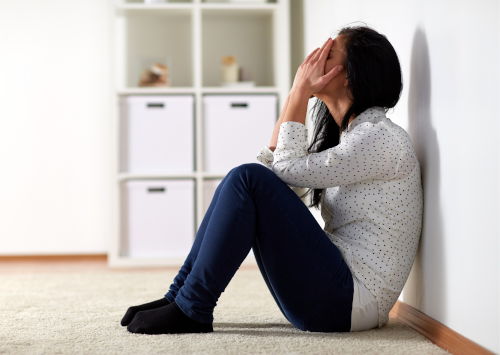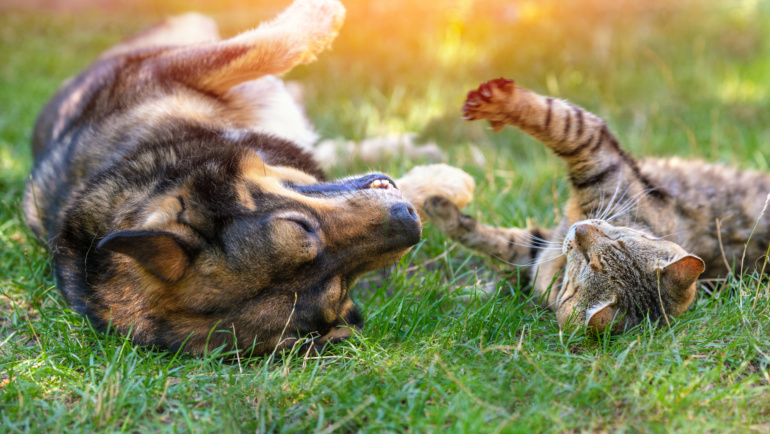Anxiety is a natural and vital reaction that protects us from danger. However, if our anxiety gets out of control and takes on a pathological form, our everyday life can be severely affected. Excessive anxiety can manifest itself in fear of everyday situations, objects or even for no apparent reason. For a long time, those affected therefore resorted to psychotropic drugs. In recent years, however, the use of cannabidiol (CBD oil) has also become increasingly popular in this area. But how exactly can CBD help with anxiety? We would like to get to the bottom of this in this article based on various studies and experiences.

Causes, symptoms and different types of anxiety
Anxiety is a widespread phenomenon around the world. According to the WHO, an estimated 3.6% of the world’s population, i.e. around 264 million people worldwide, suffered from anxiety disorders in 2015. Anxiety is generally more common in women than in men, with up to 7.7% of the female population affected in some regions of the world. Interestingly, the prevalence rates of anxiety disorders hardly vary between the individual age groups. However, there is a slight tendency towards lower rates among older people.
Causes of anxiety disorders
The exact causes of anxiety and panic attacks are complex and have not yet been fully researched. Current studies assume that genetic, neurobiological and psychological factors all play a role:
- Genetically speaking, anxiety patients often have a family background, which indicates hereditary influences.
- From a neurobiological perspective, imbalances in certain neurotransmitters, such as serotonin, GABA and noradrenaline, could trigger anxiety.
- Psychological aspects, such as prolonged stress or traumatic experiences, also contribute to the development of anxiety disorders.
Symptoms of an anxiety disorder
When a person suffers from an anxiety disorder, their body goes through a complex process. The perceived information is classified by the brain as threatening, taking into account past experiences. This triggers a chain reaction in which the body releases stress hormones such as adrenaline and cortisol. This accelerates the heartbeat and causes a rise in blood pressure. The muscles tense up for a possible fight or flight response. Breathing also speeds up to meet the oxygen demand. At the same time, digestion and sexual functions are downregulated, as they are not required in an acute stress situation.
Anxiety can manifest itself as follows:
- Accelerated heartbeat or intense throbbing in the chest area.
- Difficulty breathing or shortness of breath.
- Uncontrollable shaking or trembling of the body.
- Heavy sweating, sudden heat waves or cold sensations.
- Feeling of light-headedness or slight dizziness.
- Sensations of numbness or a tingling sensation on the skin.
- Feeling of emptiness or disorientation in the head.
- Feeling of pressure or tightness in the neck and chest area.
- Seizure-like nausea or stomach problems.
Different forms of anxiety disorder
In general, a distinction can be made between the following forms of anxiety disorder:
- Generalized anxiety disorder (GAS): Sufferers experience persistent anxiety in several areas of life, accompanied by symptoms such as palpitations, trembling, muscle tension, sweating, restlessness, cold and clammy hands, dry mouth and nausea.
- Panic disorder: Characterized by intense fear in situations such as crowds, when driving or in public places.
- Post-traumatic stress disorder (PTSD): Includes recurring stressful memories and flashbacks to traumatic events, avoidance behavior, nervousness, irritability and a loss of interest in previous activities.
- Specific phobias: Relate to extreme fear of certain objects or situations, such as animals (e.g. spiders, birds), the sight of blood, syringes or injuries.
- Social anxiety disorder: manifests itself in a fear of social interactions, public speaking, exams or keeping important appointments.
How CBD can help with anxiety
In recent years, various scientific studies have looked at the effect of cannabidiol (CBD) on anxiety. The results of these studies have been very promising.
In the following sections, we would like to highlight the findings from recent studies on the potential of cannabidiol (CBD) in the fight against anxiety.
CBD and serotonin interaction
Current clinical studies show that cannabidiol (CBD) interacts with the serotonin 5-HT1A receptor in the brain. This can lead to an anxiolytic effect. In these experiments, rats were given CBD regularly over a period of seven days, which resulted in a significant reduction in anxiety-like behavior. These results may also indicate a possible efficacy in humans.
CBD for various anxiety disorders
Another study confirms that CBD has the potential to effectively treat a variety of anxiety disorders. These include, for example, generalized anxiety disorder, panic disorder, social anxiety disorder, obsessive-compulsive disorder and post-traumatic stress disorder. However, this study also emphasizes the need for further research. This is the only way to understand the long-term and therapeutic effects of CBD in these areas.
Case study on CBD and anxiety disorders
A case study by Shannon et al. from 2019 showed that cannabidiol supplementation led to a significant reduction in anxiety symptoms in patients with anxiety disorders. Among the participating patients, anxiety levels decreased in 79.2% of subjects in the first month and remained low throughout the duration of the study. These results underline the potential benefits of CBD in the treatment of anxiety-related disorders.
CBD and social phobia
Another study by Bergamaschi et al. from 2011 focused on people with social phobia. Before a public speaking situation, participants were given either a single dose of CBD or a placebo. The subsequent results showed that CBD significantly reduced anxiety, cognitive impairment and discomfort during the speech and reduced general anticipatory anxiety.
The dosage of CBD for overcoming anxiety
When using cannabidiol (CBD) to manage anxiety, there is no one-size-fits-all solution. Instead, the dosage can vary from person to person. However, the majority of those affected prefer a low, daily dose. Only in acute moments of stress or when there are signs of a panic attack is the amount increased.

The choice of dosage form ultimately depends on your personal preferences and individual reaction to CBD. Products with terpenes are particularly recommended as they utilize the so-called entourage effect. Due to the mixtures of plant substances, which have a higher biological activity, optimal synergy effects can be achieved here.
The right CBD oil concentration
The optimal concentration of CBD oil varies depending on the individual reaction and severity of the anxiety. For mild cases of anxiety, a daily intake of 5 to 10 drops of 10% CBD oil may be sufficient. For more intense panic attacks, a 20% oil is often more effective. However, to achieve the best possible effect, the dosage should always be adjusted gradually.
Are side effects possible with CBD oil?
Although it is virtually impossible to overdose on CBD, you should always start with a low dose. This will minimize any side effects. In the unlikely event that you suffer from side effects, the dose should be reduced and a doctor consulted if necessary. Accompanying therapeutic treatment can also be helpful to promote mental balance.
Can CBD oil make anxiety worse?
In most cases, users report positive experiences with CBD oil for anxiety disorders. An exacerbation of symptoms by CBD is rare, but can occur with high sensitivity or existing illnesses. For this reason, careful observation is important. If you suffer from particularly severe anxiety, professional therapeutic support is also recommended.
Great potential of CBD for anxiety
Numerous studies confirm that cannabidiol (CBD) is a safe and promising option for the treatment of anxiety, panic attacks and anxiety disorders. However, studies to date have mainly investigated the short-term effects of CBD. Further research is therefore needed to confirm the long-term effects. Only then can the full therapeutic potential of CBD be understood. However, many sufferers are already reporting noticeable relief from their anxiety after taking CBD oil. For this reason, it may well be worth considering this natural alternative for the treatment of anxiety.
Quellen:
World Health Organization, Depression and Other Common Mental Disorders, 2017
Gregorio D, Cannabidiol modulates serotonergic transmission and reverses both allodynia and anxiety-like behavior in a model of neuropathic pain, 2019
Blessing E, Cannabidiol as a Potential Treatment for Anxiety Disorders, 2015
Shannon S, Cannabidiol in Anxiety and Sleep: A Large Case Series, 2019
Bergamaschi M, Cannabidiol reduces the anxiety induced by simulated public speaking in treatment-naïve social phobia patients, 2011




